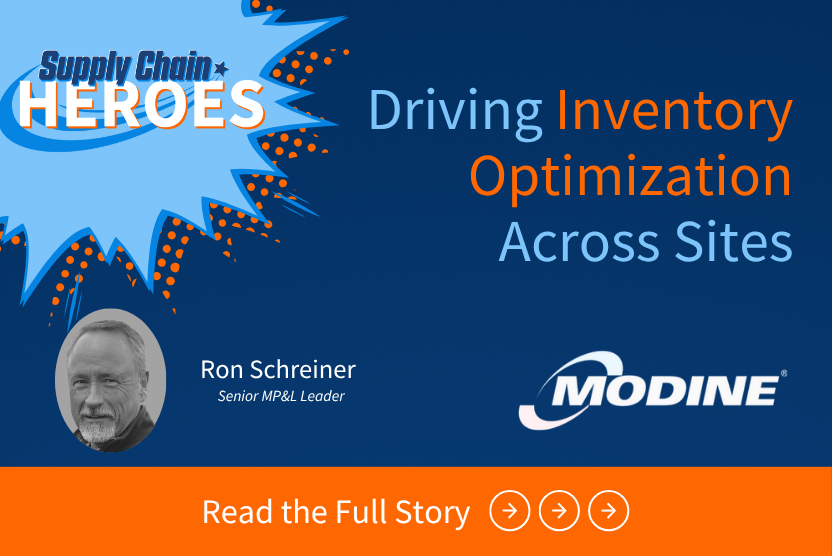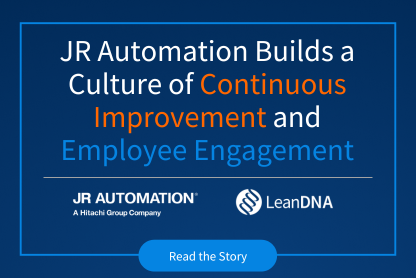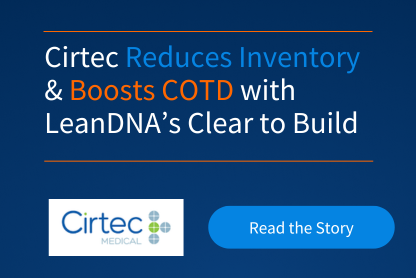Key Results:
- 30% Purchased Inventory Reduction
- Data Quality Improvement Resulting in Increase Efficiency
- Time Savings for IT and Supply Chain Teams
About IPM
Integrated Packaging Machinery (IPM) designs, engineers, integrates, installs and automates high-speed, high volume secondary packaging systems. There is a lot at risk if the packaging systems in a food processing plant are interrupted for any reason. IPM’s deep expertise is in reliably and profitably maximizing packaging line uptime.
IPM’s approach to customer-specific integration empowers and equips their food packaging customers to meet the quality expectations of their wholesale and retail end-users.
Located in the heart of West Michigan, IPM is a leader in manufacturing and integration of downstream, end-of-line packaging equipment. IPM serves North American customers in the Food & Beverage, Frozen Foods, Life Sciences and other highly-regulated markets.
Before LeanDNA
IPM was focused on improving data integrity. Some data inaccuracies made it difficult to make decisions, slowed down their production, and led to time-consuming processes. There was no clear way to get ahead of lead times, and setting correct MinMax ordering policy setpoints was challenging when the ERP data was not clean, making their processes time consuming and clunky.
“The number one thing we focused on to start was [adjusting] the lead times because without that you don't know what kind of [stock] values you can maintain,” said Charles Bliss, IT Project Manager at IPM. IPM’s primary goal of reducing their purchased inventory value while continuing to provide high COTD is what ultimately led them to partner with LeanDNA.
Results with LeanDNA
Leveling-Up Data Integrity
Choosing to implement a cloud-to-cloud integration allowed IPM to improve efficiency, scalability, and reduce costs and labor in a rapidly evolving digital landscape. The cloud-to-cloud integration offers agility by enabling quick deployment of new applications and services without the complexities associated with traditional integration methods. Additionally, cloud-to-cloud integration reduces risk of data errors by automating the data processing and eliminating manual entry errors, ensuring data accuracy and consistency across platforms. Ultimately, the cloud-to-cloud integration was part of IPM’s continuous data integrity improvement and gave them visibility into some “bad” data in their ERP system.
Higher Efficiency Across Teams
In the past, the IT team ran their own business queries and the supply chain team relied on them whenever they needed a report. With cleaner and more accessible data through LeanDNA, the IT team empowered the supply chain team to be more self-sufficient when running business queries. Being able to run their own reports and having visibility into their progress has improved the entire production and procurement process. The supply chain team can now see data more quickly for themselves, helping them make faster decisions on specific production blockers. Not to mention freeing up the IT team’s time to focus on other initiatives and projects.
Achieving Purchased Inventory Reduction
Starting with a purchased inventory of $8.16M, IPM dove right in and started using LeanDNA’s Inventory Actions. This allowed them to assign and collaborate across teams on essential inventory actions to rightsize inventory and improve overall supply chain performance.
“When our team started to investigate the Inventory Actions feature, that gave us more insight to understand how we were over purchasing. Our ERP offers PO Suggestions, but not to the level of detail and organization of data that LeanDNA provided. We saw immediate improvement to our goals to reduce inventory levels.”-Charles Bliss, IT Project Manager at IPM.
Working with LeanDNA, IPM used the Plan for Every Part (PFEP) suite of reports to adjust their min/max values. Once the new MinMax policy was defined, item master min/max values were adjusted to match the LeanDNA recommendations, resulting in a reduction of their overall inventory.
Additionally, keeping an eye on LeanDNA’s Inventory Optimization Graph, which shows projected and potential purchased inventory values, allowed them to stay on track toward their EOY inventory reduction goal. IPM has successfully reduced their purchased inventory from $8.16M to $5.76M, which is a 30% reduction in the first 6 months. They are projected to continue that trend to reach their EOY goal of $5.25M in purchased inventory, totalling a 36% purchased inventory reduction.
“The support that we’ve received through this whole process has been phenomenal. There’s such a handshake between LeanDNA and IPM. I think we are going to work really well together for a long time.” -Charles Bliss, IT Project Manager at IPM
Get a copy of this case study as a printable PDF.
Find out how you can reach new milestones in your supply chain execution like IPM.
Set up 15 minutes with one of our inventory optimization experts.






